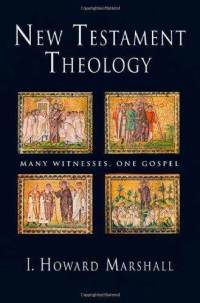 I. Howard Marshall's chapter of Matthew in terms of Dogmas, Doctrines, Distinctives, and Details.* Dogmas. Marshall largely affirms the crucial tenets of Christianity, but often flirts with non-orthodox ideas such as the concept of a “Historical Jesus” (which if seen as an ordinary man deified by history would undermine Salvation). However, Marshall approves of Christ's teaching of God as Father whose “relationship is spiritual rather than being based on creation” (100). He also affirms that Jesus is the Son of God, the Messiah, and third member of the Trinity (113-4) as promised in the Old Testament (116). This orthodox Christology is rounded out with Jesus' deity being pointed to by Jesus as Son in an exclusive relationship with the Father more fully developed in John (103). Marshall also confirms the exclusivity of Christ in stating that the Kingdom of Heaven is the only way (125). Ideas that derail God's plan of salvation, namely that the Great Commission was completed with just Israel in the book of Acts, are mentioned (102), but Marshall seems to tactfully dismiss them. Doctrines. Marshall speaks of Jesus' teachings from a position that often feels akin to post-modernism, using phrases such as “...as understood by Matthew.” Higher Criticism remarks seem to undercut the unity and authority of scripture with statements like “the law as reinterpreted by Jesus” to mean what Jesus expected now to be kept as opposed to what the Law always intended, but Jesus is now reclaiming or clarifying from the addition of the Mishna. While the position of infallibility is sufficient, denying inerrancy begs the philosophical question of ultimate authority, which is not addressed here. Marshall's Arminianism peaks through in several places, but especially with his emphasis on the Sermon on the Mount as emphasizing the importance of obedience to the words of Jesus and the will of God, such that “the Christian life is a matter of obedience and not just of faith” (100). This is a sentiment that Reformed theologians would not deny, but could be seen as foundational to doctrines impacting Soteriology such as works-based righteousness or losing one's salvation. Regardless, Marshall is clearly against, in the words of Bonhoeffer, “cheap grace,” making sure his readers are aware that “Matthew allows no complacency among his Christian readers” (108, emphasis added). Distinctives. An underlying current of grace to those in need vs. those who've earned it seems to pop up sporadically. This interpretation seems to de-emphasize God's equality while elevating God's greater concern for the needy(107), a theme that would impress Liberation Theologians and Holism writers. Marshall reinforces this idea by seeing the beatitudes as most probably a cry for justice rather than hunger and thirst for righteousness or justification by faith (120). However, Marshall still affirms the brotherhood of all believers and servant leadership while deying a works-based righteousness. Marshall affirms an eschatological dualism (99), which often impacts daily church ministry. Details. Marshall tiptoes around the Dispensational debate questioning the Jews first mentality (101), whether the Church replaces Jews (108), and how many eras there are (116) before ultimately seeming to promote a covenantal view (124). There is some flippancy in Marshall's words in reference to some difficult passages (15:21-28) as “embarrassing” (101). His word choice may simply have been poor (he later cites Jesus' “eventual response” (123)), but this could be indicative of a Dogma level issue if he is actually subjugating the Word of God to popular modern sentiments rather than visa versa.
*Dogmas are theories directly impacting God's mission to reconcile all people to Himself (orthodoxy & orthopraxy required). Doctrines indirectly impact God's mission (and are thus vitally important), but people can fail to interact with or understand them accurately (essential to orthodoxy, not orthopraxy). Distinctives don't affect the orthopraxy of salvation, but will impact the orthopraxy of a church. Details have little to no effect on orthodoxy or orthopraxy.
0 Comments
Leave a Reply. |
AuthorBrett Yardley: Categories
All
Archives
January 2019
|

